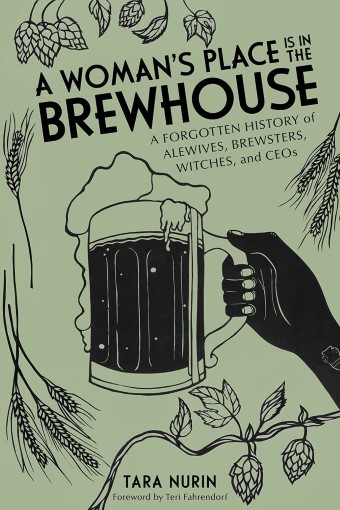
“Our Story,” posted on the Wasatch Brewing website is rather brief. To recap, Greg Schirf founded the Utah brewery, it opened in 1986 and a brewpub followed in 1988.
There is nothing about who brewed the first beers. She was Mellie Pullman, described by Tara Nurin in “A Woman’s Place is in the Brewhouse” as “a homebrewer, engineer, construction worker, and restaurant employee in Park City who, upon spotting a business plan for a brewery lying on a table in a friend’s condo, decided to quit her engineering job to invest and run its operations.”
She headed up the brewing operations and hired women to work with her in the brewhouse.
 It’s the sort of origin story that has been told thousands of times since Jack McAuliffe (and Suzy Stern and Jane Zimmerman, although they are not mentioned much more often than they are) founded New Albion Brewing Company in 1976. But it will be new to most who read “A Woman’s Place in the Brewhouse” because it has pretty much been part of “A Forgotten History of Alewives, Brewsters, Witches, and CEOs.”
It’s the sort of origin story that has been told thousands of times since Jack McAuliffe (and Suzy Stern and Jane Zimmerman, although they are not mentioned much more often than they are) founded New Albion Brewing Company in 1976. But it will be new to most who read “A Woman’s Place in the Brewhouse” because it has pretty much been part of “A Forgotten History of Alewives, Brewsters, Witches, and CEOs.”
“A Woman’s Place” is an ambitious book, exhaustive and at times exhausting. That is as it should be, because Nurin makes it obvious why women should be exhausted. Why, given the evidence she presents, should they still have to prove their place has always been in the brewhouse?
Earlier this summer, Jeanette Winterson published her latest book, “12 Bytes: How We Got Here. Where We Got Next.” It is about female scientists and other visionaries. In The Guardian, Clarie Armistead wrote, “This means writing women back into history as active contributors to the modern world, capable of imagining the future, breaking codes and solving the knottiest scientific problems.”
That is what Nurin has done, going back and forth between ancient and not-so ancient history and history in the making. As a press release for the book states, “It’s a history that’s simultaneously inspiring and demeaning. Wherever and whenever the cottage brewing industry has grown profitable, politics, religion, and capitalism have grown greedy. On a macro scale, men have repeatedly seized control and forced women out of the business.”
The book is at its best when she is talking to the women of the “craft era,” about what has and has not changed, but also what might come next. Her final chapter concludes with a list of similarities women in the book share. “Always, without exception, focused on forward-thinking and looking forward, even when paying homage to the past,” she writes. “Thanks to them, I believe this book has no end.”
To return to Mellie Pullman, she did not disappear into the ether after leaving Wasatch. She settled into an academic career and since 2005 has been a professor at Portland State University, serving as the director of the business of craft brewing program. Tiah Edmunson-Morton collected her oral history for Oregon State University in 2016.
At Portland State, Pullman remains an agent of change in beer. Had she chosen a different path in academia, her influence would still be felt. When Pullman was still at Wasatch, a young bartender who worked across the street would stop in to ask her questions about brewing. Later that bartender, Jennifer Talley, got a job brewing at nearby Squatters brewpub. Her beers won more than 20 Great American Beer Festival and World Cup medals and she was given the annual award for innovation in brewing from the Brewers Association.
Talley obviously belongs in the brewhouse. She also wrote a book, “Session Beers: Brewing for Flavor and Balance,” that a new generation of brewers will be using for years.
A new generation of brewers will also be better off because of Nurin’s book, and she’s already collecting names for the next edition.